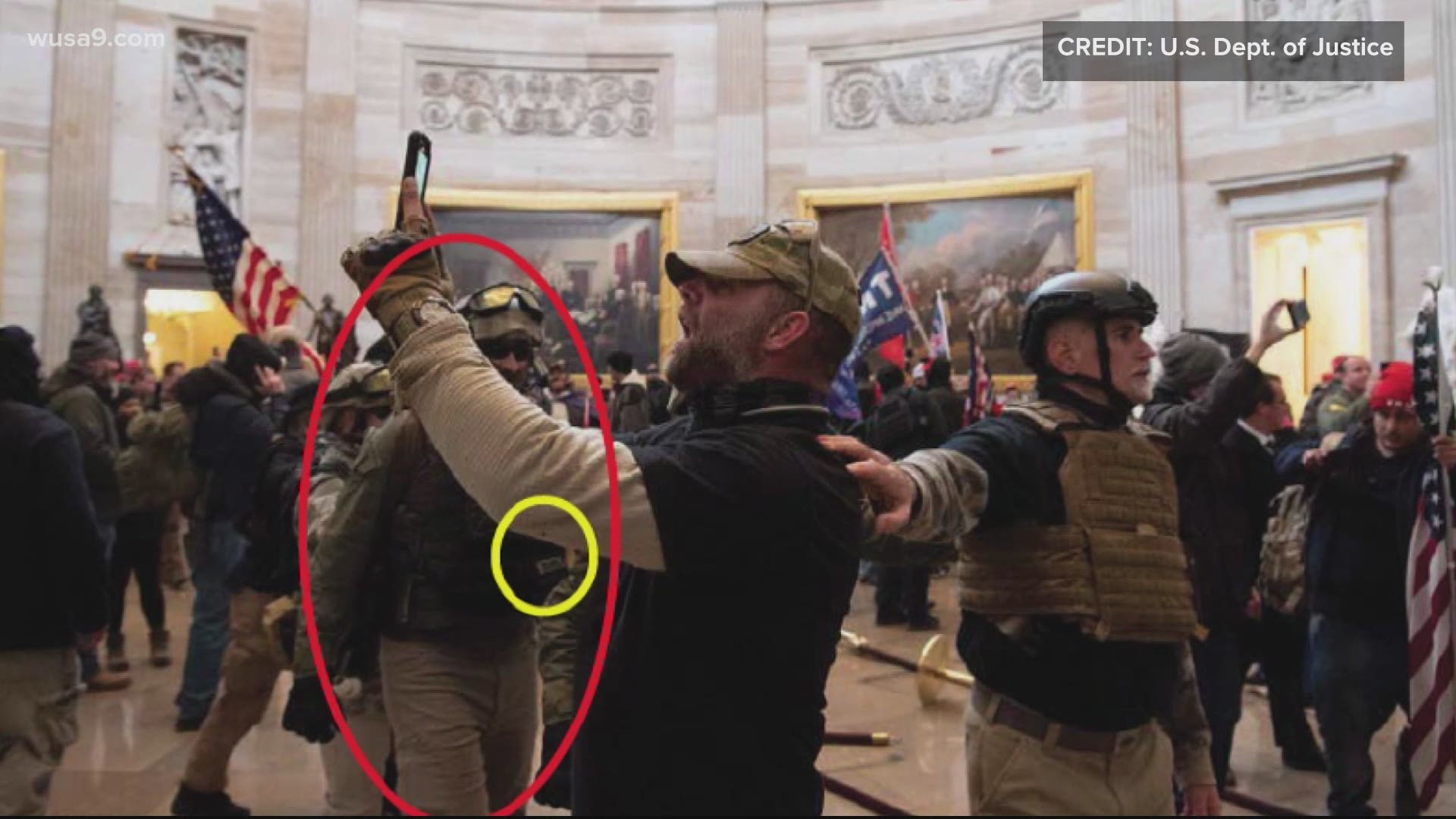WASHINGTON — The first group of more than a dozen Oath Keepers charged in the January 6 Capitol riot is scheduled to begin trial in April, but as that date approaches, one of their attorneys wants to know: How you can prosecute a conspiracy case without charging their leader?
Carmen Hernandez, who’s representing defendant Donovan Crowl in the government’s largest January 6 case, said it hampers her and other defense attorneys’ ability to plan for trial when they don’t know whether the organization’s leader, Stewart Rhodes, is going to be a co-defendant.
“Frankly,” Hernandez told U.S. District Judge Amit P. Mehta during a hearing Monday, “I don’t see how any Oath Keepers conspiracy charge can be tried” without Rhodes in the mix.
Rhodes, a Yale-educated lawyer and U.S. Army veteran, founded the Oath Keepers in Nevada in 2009. The group attempts to recruit military veterans, police officers and first responders to “defend the Constitution,” according to its website. Prior to January 6, Oath Keepers members have been involved in a number of conflicts with government officials, including the 2014 standoff between the Bundy Family and the Bureau of Land Management. One of the group’s members, Daniel Knight Hayden, of Oklahoma, was sentenced to eight months in prison for threatening violence against government officials.
The Southern Poverty Law Center describes the Oath Keepers as a “fiercely anti-government militaristic group” fueled by Rhodes’ own “conspiracy-flamed convictions.” The Anti-Defamation League places the Oath Keepers within the larger “Patriot” movement that believes “the federal government has been coopted by a shadowy conspiracy that is trying to strip Americans of their rights.”
The Justice Department has alleged extensive involvement by Oath Keepers in the events of January 6 – everything from providing private security for Roger Stone to planning “quick reaction forces” of armed members outside D.C. More than 20 members of the militia group have been indicted in a multi-state conspiracy case alleging they plotted in the weeks leading up to January 6 to disrupt the joint session of Congress. At least three of the defendants in that case have already agreed to plead guilty and cooperate with prosecution. One, Mark Grods, has agreed to testify that the group conspired to bring paramilitary gear and supplies – including firearms, camouflaged combat uniforms and radios – and to forcibly storm past the exterior barricades to enter the U.S. Capitol Building.
Another Oath Keeper – heavy metal guitarist Jon Schaffer, who has self-described as a founding member of the group – was the first January 6 defendant to accept a plea offer in the case. He was also expected to cooperate with investigators looking into the group.
Rhodes appears repeatedly as “Person 1” in court documents related to the Oath Keepers cases. In charging documents against New Jersey resident and alleged Oath Keepers organizer James Breheny, investigators say they obtained communications showing Rhodes took part in a leadership meeting of “multiple patriot groups” on January 3.
In plea documents for another Oath Keeper, Graydon Young – who allegedly helped recruit his sister and co-defendant, Laura Steele, into the organization – prosecutors say they’ve identified footage of Young and other Oath Keepers regrouping less than 100 feet from the Capitol building with Rhodes after the “stack” had entered the Capitol.
During the riot, according to Signal chats obtained by investigators, Rhodes is alleged to have been in communication with Oath Keepers at the Capitol.
“All I see Trump doing is complaining. I see no intent by him to do anything. So the patriots are taking it into their own hands. They’ve had enough,” Rhodes allegedly wrote in a Signal chat an hour before the “stack” entered the building. authorities say.
Rhodes has not, to date, been charged in connection with January 6 – although that does not mean he has escaped legal woes. In August, seven U.S. Capitol Police officers named Rhodes and other members of the Oath Keepers, along with former President Donald Trump, in a civil suit accusing them of violating the Ku Klux Klan Act and committing acts of domestic terrorism.
Rhodes is also one of numerous individuals subpoenaed by the January 6th Committee as part of its own investigation into what happened at the Capitol. In a letter to Rhodes dated November 23, committee Chairman Bennie Thompson (D-MS) said Rhodes, in a statement on the militia’s website, had called on Oath Keepers to prepare for a “full-on war in the streets.” Rhodes gave a speech on December 12 in D.C. calling on Trump to invoke the Insurrection Act, “warning that the Oath Keepers would mount a ‘much more desperate [and] much more bloody war’ if he did not do so.” Thompson also wrote that multiple Oath Keepers were captured on video on or around January 6 outside the Willard Hotel – which the committee has honed in on as the “command center” for events surrounding the “Stop the Steal” rally.
The first group of Oath Keepers is set to begin trial at the beginning of April, although prosecutors suggested Monday they may want additional time to resume plea discussions after Mehta rules on a challenge brought by the defendants against the obstruction charge in the case. The Oath Keepers are among a group of January 6 defendants challenging the DOJ’s application of that statute by arguing that the joint session of Congress was not an “official proceeding” under the letter of the law.
We're tracking all of the arrests, charges and investigations into the January 6 assault on the Capitol. Sign up for our Capitol Breach Newsletter here so that you never miss an update.

